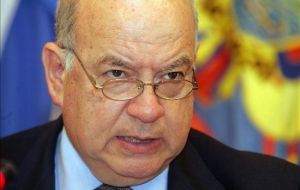MercoPress. South Atlantic News Agency
OAS warns about ‘distinct categories of citizens’ in terms of access and quality to basic services
 Insulza pointed out to “the democratic fallacy that the majority has the right to change the system as it sees fit.”
Insulza pointed out to “the democratic fallacy that the majority has the right to change the system as it sees fit.” The Organization of American States (OAS), Secretary General José Miguel Insulza, highlighted the “important progress” made in the region’s democratization in recent decades, but also warned about worrying “risks of deconstruction” which are creating ‘distinct categories of citizens’ particularly in terms of access and quality to basic services such as education, health and security.
“There is a certain correspondence between the optimism with which the future of the economies in Latin America is perceived, and the feelings towards the political process, or in other words, the state of our democracies,” said Insulza during the inauguration of the 2013 Latin American Studies Association (LASA) Congress at Georgetown University.
As examples of progress, the OAS leader highlighted that “electoral processes have made considerable headway. Governments are created through clean, secret, universal elections, and regularly change hands among different political groups, without entailing a significant disruption.”
“I can speak from experience here,” he added, “since in just the past five years, the OAS has observed more than 80 election processes of all kinds in different countries of the region, and each of them has more than fulfilled the requirements for a democratic election.”
“There is no doubt that our societies have made important progress on the road to democratization,” said the Secretary General, but acknowledged limitations remain, some of which “can be attributed to the still short time in which all of these events have developed.”
Among the most important challenges to the democracies of the Americas, the head of the OAS cited poverty and inequality, organized crime and insecurity, weak institutions, and “the democratic fallacy that the majority has the right to change the system as it sees fit.”
But on concluding his speech, Secretary General Insulza said that “the risks of de-construction are there.” “Because criminal groups today are a seed of independent power; they control their own territories and of course obey their own laws, which they impose on others outside the authority of the state”.
Insulza emphasized that there are growing privileges leading to the ‘creation of distinct categories of citizens” and that is because of the existence of systems of health, education, and security that are differentiated in terms of access and quality lead to the creation of distinct categories of citizens.
“And because in some countries, the necessary measures of consensus that should exist in every democratic society, are giving way to extreme political polarization, and this is not a good foundation for the urgent reforms still required in Latin America,” said the Secretary General.
Carol Lancaster, Dean of the School of Foreign Service at Georgetown University welcomed Secretary General Insulza, said that Latin America has seen significant changes in recent decades.
“It is now much more prosperous, less unequal, more democratic, healthier, better educated, and most important in the world. That does not mean it has reached Nirvana, but from my point of view, it seems to have made significant progress, which is often unrecognized in the United States.”
The Congress Co-Chairs Gwen Kirkpatrick, of Georgetown University, and Kenneth Roberts, of Cornell University, opened the event and introduced its theme “Latin America: Toward a New Social Contract.”
LASA is the largest professional association in the world for individuals and institutions dedicated to the study of Latin America. With more than 7,000 members, 45% of whom reside outside the United States, LASA is the association that brings together experts on Latin America from all disciplines and various professional efforts worldwide. The Congress will have more than 900 sessions, and more than 4,000 participants.





Top Comments
Disclaimer & comment rules-

-

Read all commentsWhat's the matter with this man? Has he not “noticed” La Campora and Quebracho? Both organised by the local gangsters. Sorry, that should have been “government”. Hey, in latam, what's the difference? Who does he think they are? The local version of Brownies? Cubs?
Jun 01st, 2013 - 02:18 pm 0Latin American countries have made several political, social and economic changes during the last 50 years. However, basic human needs such as clean water, electricity and pave roads are currently in need.
Jun 02nd, 2013 - 04:01 pm 0Two new powerful and negative factors are currenlty in motion in Latin America that is the increase of drugs production and personal security.
Naturally, this social phenomemon is due to the high unemployment in Latin America, specially among young people.
Countries must inyecting programs towards good health and afforable education to all, being this the correct way to combat most social problems. However, you will notice that most Latin American countries have Billion of Dollards expending on war weapons, considering that it is a peaceful war region. So, their leaders need to do better homework.
Kirk, New York.
Commenting for this story is now closed.
If you have a Facebook account, become a fan and comment on our Facebook Page!